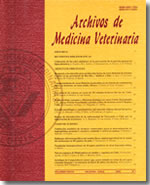Porcine Stress Syndrome
Main Article Content
Abstract
The Porcine Stress Syndrome or Malignant Hyperthermia is an inherited autosomal recessive disease, where the susceptible allele is denominated T and the normal stress- resistant allele C. The stress susceptible pigs present death prior to slauhgter and pale, soft and exudative meat in the carcass. The Ryr1 gene mutant in 1843 nucleotide is the cause of Porcine Stress Syndrome. This gene has been studied and discussed widely. At the beginning of the Seventies this gene was important for genetic companies when speculated with the existence of a monogenic variation in the susceptibility to stress, and Eikelenboom and Minkema demonstrated that the Stress Syndrome could be caused by the halothane gas. Most of the studies in positive stress pigs and negative stress pigs showed differences in pH, colour, tenderness and water-holding capacity in the meat. This variation was related to the incidence of pale, soft, exudative meat in the two genotypes. In 1990 MacLennan and collaborators proposed that the ryanodine receptor gene was the gene candidate that predisposed to Malignant Hyperthermia. Fujii in 1991 discovered the mutation responsible for the Porcine Stress Syndrome in the Ryr1 gene, which codifies the calcium release channel of the sarcoplasmic reticulum by the skeletal muscle. The analyses based on DNA (PCR, RFLP) allow to diagnose the three genotypes of the SSP, directing the present genetic selection to obtain resistant pigs to Porcine Stress Syndrome.

